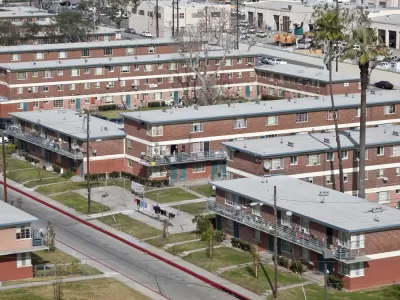Some elements of affordable housing—from the development process to the way buildings are managed—are rooted in racist assumptions that dehumanize residents. Here are some simple ways you can be a better housing provider.

Many mission-driven affordable housing providers view the creation of quality, affordable homes as one opportunity to right past wrongs. Decades of redlining, segregation, and a lack of economic and sociopolitical opportunities have negatively affected the lives of people of color.
However, too often we fail to recognize that some elements of affordable housing—from the development process to the way buildings are managed—are rooted in racist assumptions that dehumanize residents. Many times, the people who lead the decision-making around development and operations are not the ones with direct insight and expertise as to what it’s like to actually live in affordable housing. That disconnect can compound harmful policies and practices around everything from building design to the way that management communicates with residents.
How can we as a field expect to improve the quality, conditions, and inclusivity of a property without robust input from residents? Dissecting and addressing these challenges requires a critical eye, openness, the desire to improve, and a willingness to undergo a long, hard look at the ways even well-meaning housing organizations cause residents harm and undermine any mission to promote equity.
How We Signal Distrust
One way housing organizations can “right the ship” is by taking a close look at how they communicate—both directly and indirectly—with residents. Whether we realize it or not, all processes in housing development and operations convey certain messages to residents. For instance ...
FULL STORY: How Affordable Housers Perpetuate Past Harms, and How They Can Do Better

Planetizen Federal Action Tracker
A weekly monitor of how Trump’s orders and actions are impacting planners and planning in America.

Restaurant Patios Were a Pandemic Win — Why Were They so Hard to Keep?
Social distancing requirements and changes in travel patterns prompted cities to pilot new uses for street and sidewalk space. Then it got complicated.

Map: Where Senate Republicans Want to Sell Your Public Lands
For public land advocates, the Senate Republicans’ proposal to sell millions of acres of public land in the West is “the biggest fight of their careers.”

Maui's Vacation Rental Debate Turns Ugly
Verbal attacks, misinformation campaigns and fistfights plague a high-stakes debate to convert thousands of vacation rentals into long-term housing.

San Francisco Suspends Traffic Calming Amidst Record Deaths
Citing “a challenging fiscal landscape,” the city will cease the program on the heels of 42 traffic deaths, including 24 pedestrians.

California Homeless Arrests, Citations Spike After Ruling
An investigation reveals that anti-homeless actions increased up to 500% after Grants Pass v. Johnson — even in cities claiming no policy change.
Urban Design for Planners 1: Software Tools
This six-course series explores essential urban design concepts using open source software and equips planners with the tools they need to participate fully in the urban design process.
Planning for Universal Design
Learn the tools for implementing Universal Design in planning regulations.
Heyer Gruel & Associates PA
JM Goldson LLC
Custer County Colorado
City of Camden Redevelopment Agency
City of Astoria
Transportation Research & Education Center (TREC) at Portland State University
Camden Redevelopment Agency
City of Claremont
Municipality of Princeton (NJ)





























